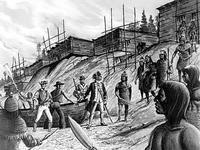Cook, James
COOK, James, British naval officer (b 27 Oct 1728, Marton, England; d 14 Feb 1779, Hawaiian Islands). After apprenticing as a sailor with a commercial shipowner, he enlisted in the Royal Navy in 1755. He rose quickly through the ranks and served as master of a gunship during the battle for Louisbourg in 1758. Cook was an accomplished surveyor and took part in the mapping of the St Lawrence R that allowed the British fleet to besiege Quebec in 1759. He later charted the coast of Newfoundland. From 1768 to 1775 he commanded the Endeavour on 2 long voyages of exploration in the S Pacific, sailing farther south than anyone before him. These voyages established his reputation as the most accomplished naval explorer in Europe. In 1776 he embarked on a third voyage in search of the Pacific entrance to the fabled Northwest Passage. With 2 ships, Resolution and Discovery, he rounded Africa and crossed the Pacific, and arrived off the coast of Oregon in Mar 1778. He then proceeded north and anchored in Resolution Cove in NOOTKA SOUND on the west coast of VANCOUVER ISLAND on 29 Mar. His contacts with the local NUU-CHAH-NULTH (Nootka) were the first interactions between the British and FIRST NATIONS people on the BC coast. After spending a month taking on wood and water, trading with the local people and repairing his vessels, Cook left Nootka Sound on 26 Apr. He did not see land again until he approached the coast of Alaska, where he explored Prince William Sound and Cook Inlet. He penetrated Bering Strait before being driven back by ice. He then returned to the Sandwich Islands (Hawaii), where he was killed by natives. Accounts of Cook's last voyage opened the northwest coast of America to the outside world and drew attention to its wealth of furs, leading to the maritime FUR TRADE.
-
Internet links

